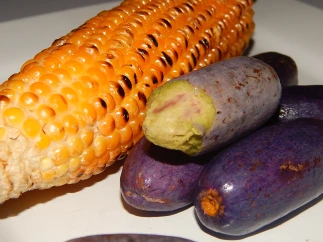Pregnant mums are always concerned about the safety of eating spicy foods when pregnant. Spicy foods usually have ingredients like hot sauces, chilli peppers, or spices like garlic, ginger, or cayenne pepper that give dishes a kick of heat.
Some expectant moms may have a strong desire for spicy meals, while others may be concerned about risks to their own or their unborn child's health. In this article, we would be answering your questions about ghana pepper and its safety during pregnancy.
What is Ghana pepper?
The term "Ghana pepper" usually describes a hot pepper sauce or spice mixture that is well-liked in Ghanaian cooking. It gives support to many different foods because of its strong heat and bright flavour. In addition to additional components including onions, garlic, ginger, and spices, ghana pepper frequently consists of fiery chilli peppers, such as the scotch bonnet or habanero peppers.
Nutritional benefits of Ghana pepper
Ghana pepper as well as other spices has a lot of benefits and serves various needs:
- Antioxidants: The heat and potential anti-inflammatory qualities of spicy peppers are derived from the presence of antioxidants like capsaicin. Antioxidants can lower the chance of developing chronic illnesses and assist in shielding cells from harm from free radicals.
- Cultural significance: Spicy foods, such as ghana pepper, are significant in cultural customs and culinary heritage, in addition to their nutritional benefits. Savouring these tastes might help people feel more a part of their community and cultural identity.
- Minerals and vitamins: Ghana pepper is made from peppers, such as habanero or scotch bonnet, which are high in minerals like manganese and potassium and rich in vitamins A and C. The immune system, eyesight, skin health, and general well-being all depend on these minerals.
- Support of the immune system: The vitamin C in hot peppers helps guard against infections and support the immune system. The immune system, which is particularly vital for the health of the mother and foetus, may benefit further from consuming ghana pepper during pregnancy.
- Excitement: Eating hot foods, such as ghana pepper, has been known to lift some people's spirits and give them a sensation of excitement or pleasure. Feelings of happiness and well-being may be influenced by the endorphins released by eating spicy meals.
- Metabolism boost: Research has indicated that capsaicin, the substance that gives spicy peppers their heat, can momentarily speed up metabolism and encourage the burning of fat. Including hot foods like ghana pepper in the diet may help with weight management, even if the effects might not be very strong.
Is it safe for pregnant women to consume Ghana peppers?
Ghana pepper and other spicy foods are typically regarded as safe for pregnant women who can handle them in moderation. Nonetheless, there are a few things to remember:
- Digestive discomfort: Because of hormonal changes and the pressure of the expanding uterus on the stomach, spicy meals may occasionally make heartburn, acid reflux, or other gastrointestinal discomfort worse. If these symptoms are experienced by a pregnant woman, she should limit her intake of spicy foods and opt for milder ones.
- Individual tolerance: Each lady has a unique capacity for hot and spicy foods. While some people may find spicy foods uncomfortable or unpleasant, others may love them without suffering any negative consequences. Pregnant women must pay close attention to their bodies' needs and stay away from meals that make them uncomfortable or create negative reactions.
Side effects of eating Ghana pepper during pregnancy
- Acid reflux and heartburn: Eating spicy meals can relax the lower esophageal sphincter, which lets stomach acid escaping into the oesophagus and results in acid reflux or heartburn symptoms. Due to hormonal changes and the pressure of the developing uterus on the stomach, pregnant women may be more vulnerable to these symptoms than other people.
- Increased thirst: Eating spicy food can make you feel thirstier and produce more saliva, which could encourage you to drink more water. But, if serious thirst is not sufficiently relieved by consuming enough fluids, it may lead to dehydration.
- Gastrointestinal troubles: Large consumption of ghana pepper or other hot foods can cause gastrointestinal distress, which may appear as loose stools or diarrhoea. This is because spicy foods may create constipation and may even act as a laxative for certain people.
It's critical to pay attention to your body, exercise in moderation, and see a doctor if you have any underlying medical illnesses or concerns that could be impacted by spicy meals.
Frequently Asked Questions (FAQs)
Is Ghana pepper the same as normal pepper?
Ghana pepper is not the same as normal pepper. Normal pepper is a common ingredient in cooking that gives food a strong, and spicy flavour.
Can pregnant women eat Ghana pepper?
Pregnant women can eat ghana pepper but in moderate quantities.
Is Ghana pepper safe for postpartum?
For most people, it is considered safe during postpartum. But others can be allergic to it. Ensure to speak with your doctor first.
Why journey alone in your pregnancy? Join over 200,000 moms in PreggClass. For medically verified information, 24/7 medical check-ups, live classes, practical sessions, and more! PreggClass goes for N10,000 per slot! Want to know more about PreggClass? Let's chat!










Comments